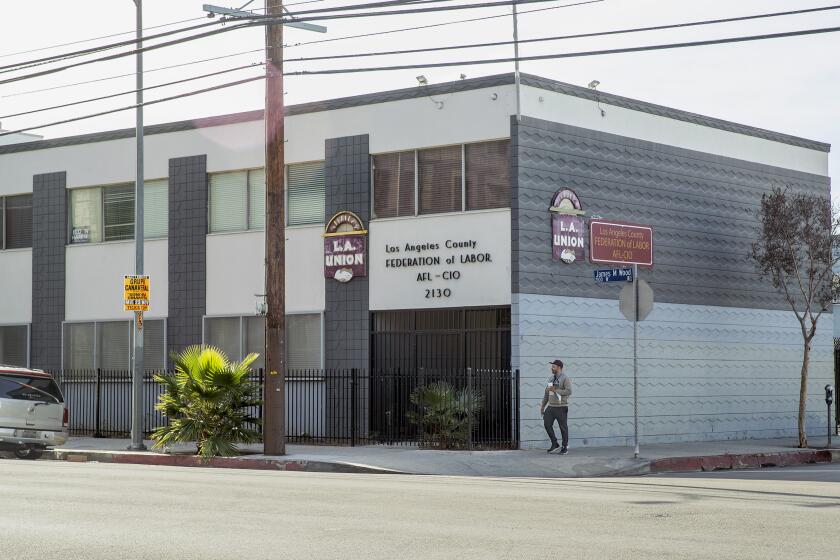State Deficit and Vehicle Tax: Big Bumps Ahead?
As lawmakers in Sacramento grapple with how to close the state’s $12-billion deficit, cities throughout California are bracing for cutbacks if the state reduces the share of vehicle tax revenue that municipalities receive.
But because of a quirk in time and incorporation laws, cities formed over the past few years will be particularly hard hit, and Orange County is home to three of the state’s newest: Aliso Viejo, Laguna Woods and Rancho Santa Margarita.
In those cities, vehicle tax revenue represents 30% to 50% of their general operating funds, and losing the money would require cuts in services from sheriff’s patrols to street repairs. By contrast, in older cities such as Huntington Beach and Anaheim, the loss of vehicle tax dollars would represent 10% and 7% of operating budgets, respectively.
Laguna Woods City Manager Leslie A. Keane said her community, which became its own city less than three years ago, might be forced to dissolve and rejoin the county as an unincorporated area.
“It’s half of our general fund budget,” Keane said. “It might represent going back to the county, shutting our doors.”
For a month now, lawmakers have been discussing the idea of taking a greater share of vehicle tax revenue as the state tries to dig out of a deficit caused by the slowing economy and cooling stock market. Gov. Gray Davis hopes to reduce the deficit with $3 billion in state budget cuts and plans a special legislative session in January to hammer out a final budget deal.
Cities are aggressively lobbying Sacramento to prevent a reduction in vehicle tax revenue but fear they have an uphill battle. When the state found itself in a similar fiscal bind in the early 1990s, it diverted local government property taxes from public safety and other local services to fund schools.
“The state has a serious budget shortfall,” said Janet Houston of the Orange County League of California Cities. “Through past experience we know they will often look to city revenues to close the gap.”
Newer cities find themselves in a particular bind. State law requires unincorporated communities that become cities to share tax revenue generated within their boundaries with the county government, which provides many of the new cities’ services. That means newer cities must pay the county millions of dollars a year.
Moreover, newer cities generally haven’t built up the financial reserves of more established towns.
This leaves the newer cities heavily reliant on the vehicle tax, which is a license fee based on the vehicle’s value.
Rancho Santa Margarita’s general fund is about $10 million, and about $3 million of that comes from the license fees.
“If I lose $3 million, either we stop everything else or cut police services. And we can’t stop everything else,” said William Talley, city manager of the nearly 2-year-old municipality.
When the city was incorporated in January 2000, it significantly increased police services from the Sheriff’s Department, adding a traffic enforcement officer and more patrols. It also brought in an officer to coordinate community and business programs.
But even if the city cuts back all the extra police services, the reduction would not completely cover the $3 million lost if the vehicle license tax is taken away.
Laguna Woods’ financial situation is different.
Because the city is gated and has association dues from the Leisure World retirement community to cover most maintenance, the city isn’t responsible for many of the municipal services associated with cities. Most of the general fund budget covers the city staff as well as police services, recreation and social programs, and participation in the anti-El Toro airport coalition.
Without the $2.5 million it receives from the fees, “All of our recreation and social services would go, and the [extra] police services would go also,” said Keane, the city manager.
The city has $5 million in reserves. But if the vehicle tax revenue is taken away, Laguna Woods could survive for only two to three years before that savings disappears, Keane said.
At that point, residents would have to decide whether to raise taxes and fees to cover the shortfall or simply unincorporate, Keane said.
Aliso Viejo would lose nearly half of its $6.9-million operating fund if the tax money is diverted to the state. Like their neighbors, city officials said it would require tough choices, such as whether to continue financing sheriff’s services and the fight against an airport at El Toro.
“Given our current budget, I don’t see how we could meet the needs of the community” without the license fees, said Aliso Viejo’s executive coordinator, Susan Taylor.
(BEGIN TEXT OF INFOBOX / INFOGRAPHIC)
Reliance on License Fees
Recently incorporated Orange County cities would lose a considerable portion of their general operating funds if the state reduces the share of vehicle license fees municipalities receive. A rundown of all cities in the county:
Aliso Viejo: 50*
Anaheim: 10
Brea: 7
Buena Park: 12
Costa Mesa: 8
Cypress: 11
Dana Point: 11
Fountain Valley: 11
Fullerton: 14
Garden Grove: 18
Huntington Beach: 10
Irvine: 9
Laguna Beach: 4
Laguna Hills: 9
Laguna Niguel: 24
Laguna Woods: 50*
La Habra: 14
Lake Forest: 27
La Palma: 10
Los Alamitos: 7
Mission Viejo: 13
Newport Beach: 4
Orange: 11
Placentia: 12
R. Santa Margarita: 30
San Clemente: 11
S. J. Capistrano: 14
Santa Ana: 13
Seal Beach: 9
Stanton: 16
Tustin: 10
Villa Park: 16
Westminster: 15
Yorba Linda: 16 *approximate
*
Source: League of California Cities
More to Read
Start your day right
Sign up for Essential California for news, features and recommendations from the L.A. Times and beyond in your inbox six days a week.
You may occasionally receive promotional content from the Los Angeles Times.






